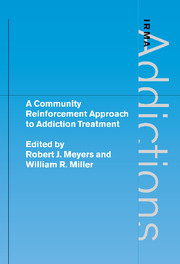Book contents
- Frontmatter
- Contents
- List of contributors
- Preface
- Acknowledgments
- 1 Developing the Community Reinforcement Approach
- 2 Practice and Promise: The Azrin Studies
- 3 The Treatment
- 4 A Comparison of CRA and Traditional Approaches
- 5 Community Reinforcement and Traditional Approaches: Findings of a Controlled Trial
- 6 CRA with the Homeless
- 7 CRA and Treatment of Cocaine and Opioid Dependence
- 8 Community Reinforcement and Family Training (CRAFT)
- 9 Summary and Reflections
- References
- Index
Preface
Published online by Cambridge University Press: 05 August 2012
- Frontmatter
- Contents
- List of contributors
- Preface
- Acknowledgments
- 1 Developing the Community Reinforcement Approach
- 2 Practice and Promise: The Azrin Studies
- 3 The Treatment
- 4 A Comparison of CRA and Traditional Approaches
- 5 Community Reinforcement and Traditional Approaches: Findings of a Controlled Trial
- 6 CRA with the Homeless
- 7 CRA and Treatment of Cocaine and Opioid Dependence
- 8 Community Reinforcement and Family Training (CRAFT)
- 9 Summary and Reflections
- References
- Index
Summary
The Community Reinforcement Approach (CRA), as originally applied to the treatment of alcohol problems and as later widened in its application to other substances, has always seemed to have common sense to recommend it. We only need a nodding experience with the behavior of children or a modicum of personal insight to find persuasive evidence that reward can alter behavior patterns. So, make stopping drinking tangibly rewarding, and troubled drinkers may be able to stop drinking – a psychological postulate much in accord with common sense and ordinary life.
In fact, in the treatment world, CRA has enjoyed a rather odd status up to now. Most researchers believe that the evidence for its efficacy is strong and reviewers have repeatedly rated this treatment approach as being better supported by controlled assessments than a galaxy of more widely favored practices. CRA seems to have become a succès d'estime only to be left on the shelf.
This immensely authoritative and comprehensive account of the origins of the CRA concept and the research evidence for its therapeutic benefits must surely do much to counter that previous neglect. It is a book which one must hope to see widely read by clinicians and those responsible for the development and provision of services. Researchers will find in its pages stimulating ideas for new applications and testings. What is also interesting about this book is that beyond its reporting of the research output it raises questions about how research in this kind of field comes to be made – there is a story here within the story.
- Type
- Chapter
- Information
- A Community Reinforcement Approach to Addiction Treatment , pp. xi - xiiPublisher: Cambridge University PressPrint publication year: 2001

